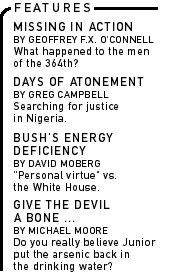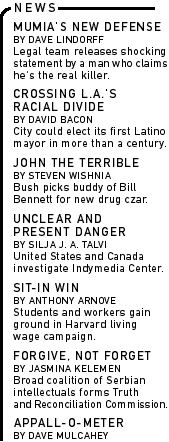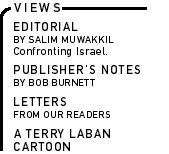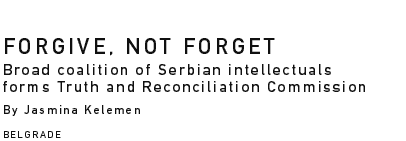

|

|

|

|
|
|
| |
|
|
|
Black-and-white posters showing refugees fleeing through streets pockmarked with bullet holes and littered with debris are posted throughout the city. On the side of the placards, a smug-looking Slobodan Milosevic puffs on a cigar over a caption asking, "Who is guilty?" For Tamara Milosevic, a 25-year-old law student who stood outside of the former president's home to witness his arrest on April 1, the answer was clear: "Milosevic ruined this country and killed so many people in his stupid wars. He deserves the worst that can happen." Other Serbs believe guilt extends beyond the shoulders of Milosevic to the citizens who cheered--or silently watched--as nationalism unraveled the Yugoslav federation. "I feel guilty because we didn't oppose the regime with enough numbers," says Vesna Petrovic, executive director of the Belgrade Center for Human Rights. Happy to have shirked their pariah status, Serbs still harbor bitter memories of economic sanctions and NATO's bombardment, and are weary of cooperating with the foreign institutions they perceive as championing the destruction of their country just two years ago. Now, with Milosevic jailed on charges of abuse of power and corruption, and facing a war crimes indictment in The Hague, a broad spectrum of Serbian writers, historians, theologians and lawyers are forming a Truth Commission to delve into the causes and apportion blame for the horrors that occurred during his decade-long rule. Many of the politicians and activists who led the struggle against Milosevic are determined to confront Serbs with evidence of the crimes against humanity that were committed during Milosevic's rule. They are demanding a complete account of the thousands who disappeared or died during the wars in Croatia, Bosnia and Kosovo. "We all have blood on our hands, in a way," says Aleksandra Beric, a longtime anti-war activist. Beric is organizing a conference that will bring representatives from other countries with truth commissions to Belgrade from May 18 to 20. "For our sake," Beric says, "if we're going to heal as a nation, we have to face what happened." Commission member Svetlana Velmar Jankovic, a writer, says the panel hopes to build contacts with similar commissions in Bosnia and Croatia. "Maybe this is how we will gain a deeper knowledge about what happened," she says. There already has been some backroom grumbling about the commission's inclusion of some Serbian intellectuals who took part in the nationalist rhetoric. However, members say the commission must represent a microcosm of the "moral dilemmas" facing Serbian society if it is to be a real symbol of unity. "How can we expect to contribute to reconciliation among people whose family members were killed by neighbors if we decide not to sit at the table with people with different politics?" asks Vojin Dimitrijevic, an international lawyer appointed to the commission by President Vojislav Kostunica. The commission is still in its formative stages and does not yet have a clear mandate to compel people to testify. Some fear the commission is being hastily and clumsily mounted to alleviate the West's increasingly impatient calls for Milosevic's extradition. Such pressure is "vulgar and counterproductive," says Dimitrijevic, who was expelled three years ago from his position as dean of Belgrade University's law school because of his opposition to Milosevic. Dimitrijevic recently dropped out of the commission, saying Kostunica had not answered his questions concerning the panel's administration and authority. "As a lawyer, it irritates me that a government pretends to respect the rule of law and then demands we extradite an ex-president without formal rules," he adds. "If people believe the commission is because of foreign pressure then we're nowhere. We have to change what people know about the war."
|

